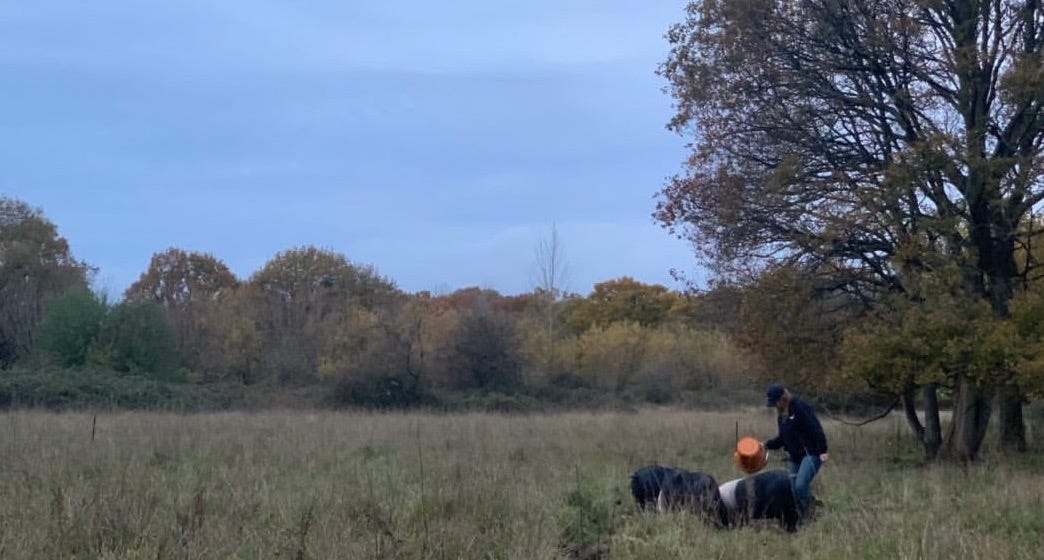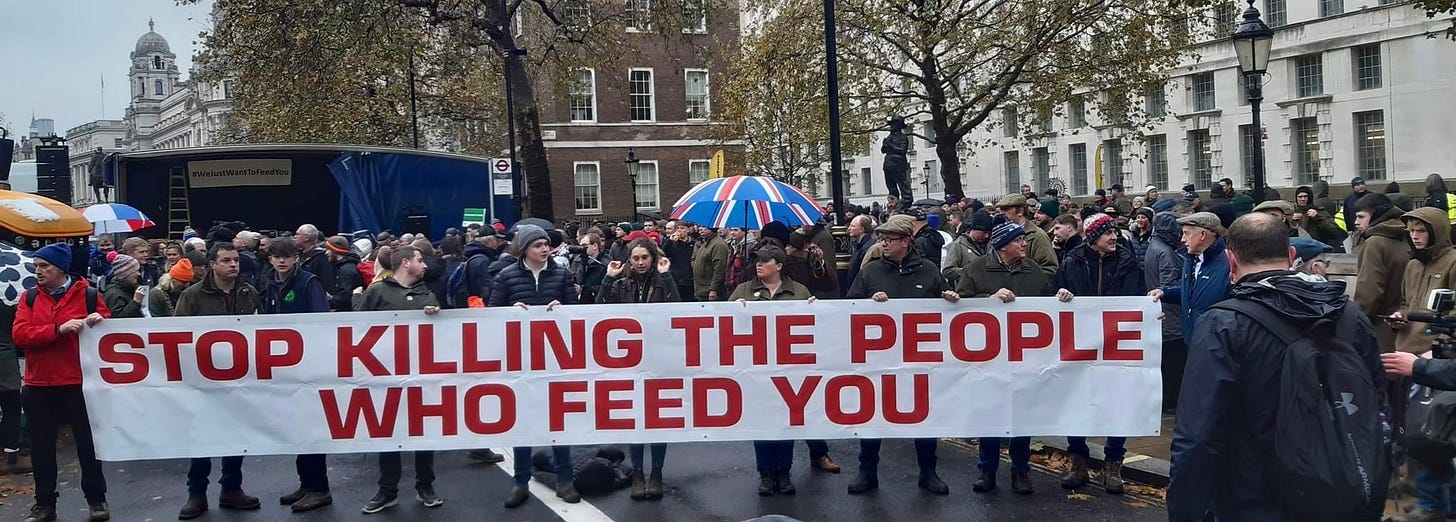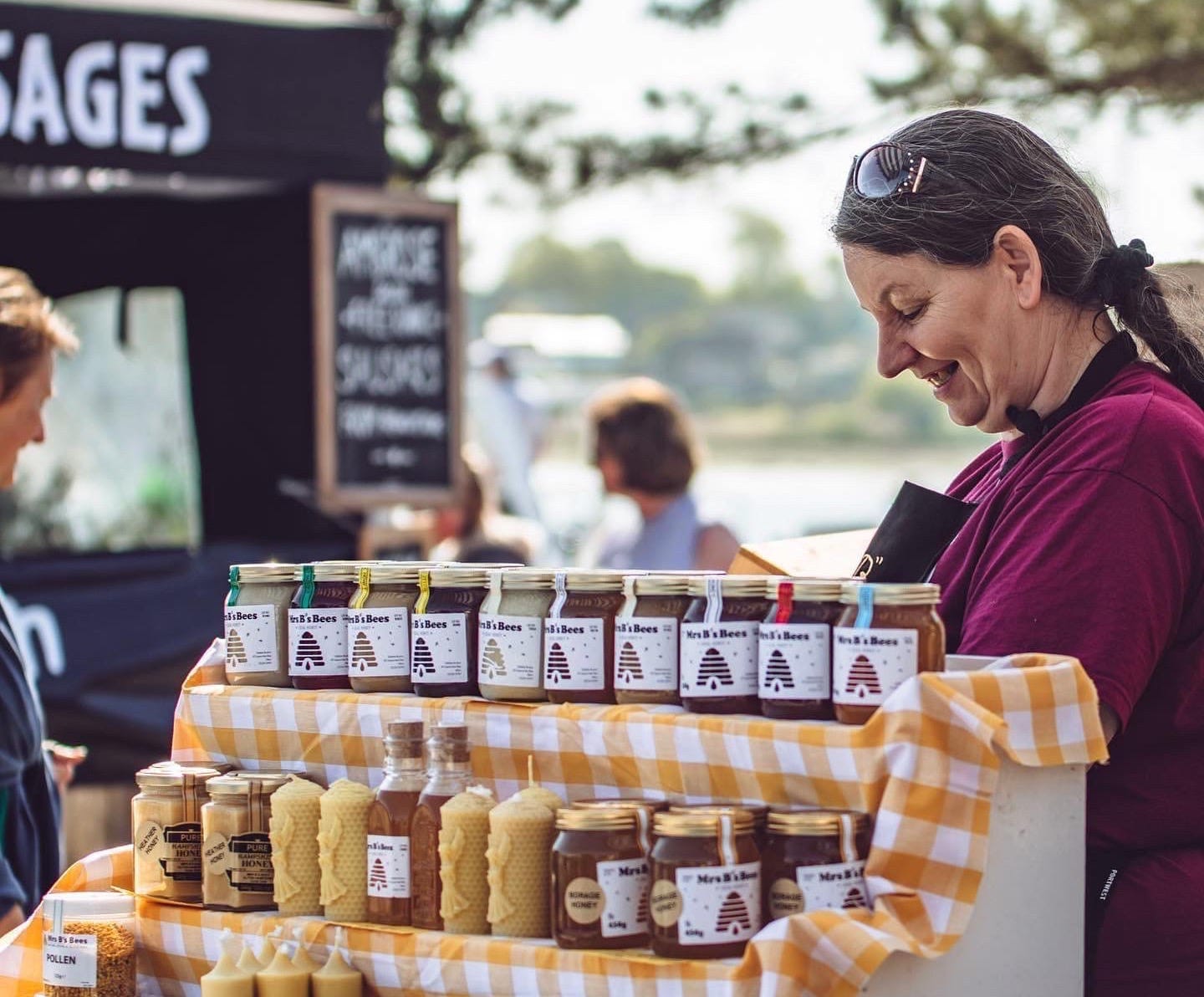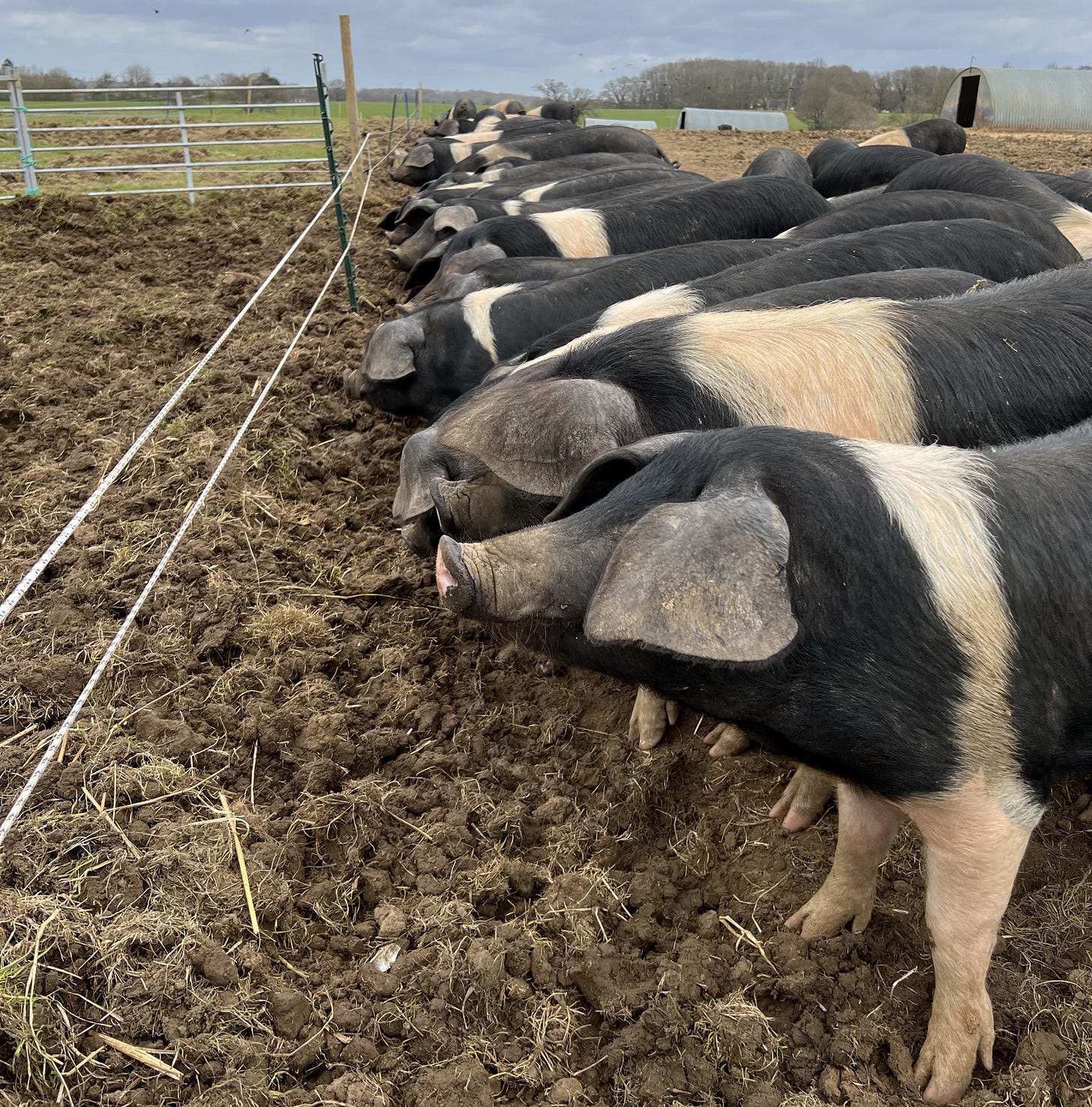Introduction: A Tipping Point
Lately, I’ve found myself speaking to more farmers who are at breaking point. Not because of storms or floods—but because of silence. Policy silence. Support silence. A deep, growing sense that no one is listening.
In recent posts, I explored the future of livestock and the role of small farms in food security. Today, I want to dig deeper into the crisis gripping UK farming. This isn’t just about policy or profit margins. It’s about people, rural communities, and the future of our food.
In this article, I’m highlighting many factors that I believe are in crisis in farming—each directly affecting food security. Sadly, this isn’t all of them. If I were to cover everything wrong with UK farming, it would be a 30-minute read. There are countless farmers out there fighting in silence, each with a unique story, but all feeding into the bigger picture of crisis. There will be a part 2 with farmer stories, because I suffered in silence with our fight for too long—probably until it was too late. Now, I’m passionate about the strength in the community I’m building here on Substack. If I tell these farmers’ stories, we can support them together, because our farmers need us now more than ever.
The £200 Million Question: Who Is This Really For?
In April, DEFRA announced a £45.6 million injection into farming innovation, headlined as a way to boost food production, raise farm profits, and “work with nature.” On paper, it sounds like good news. But for those of us farming at ground level, it raises more red flags than reassurance.
Let’s break it down.
This funding is being channelled into:
Robot fruit pickers
On-animal health monitors
Variable irrigation systems
Precision-bred crops
Technologies to reduce emissions
While the government claims this will support nature and food security, what it really reads like is a blueprint for a more industrialised food system. It’s slick, shiny, and deeply disconnected from the reality of small-scale, nature-friendly farming.
Gone are the days of support schemes like the SFI (Sustainable Farming Incentive), which at least attempted to recognise the role of regenerative and agroecological farming. Now we’re looking at funding designed for those with the resources to deploy robotics, adopt genetic engineering, and chase volume-driven yields. These aren’t solutions for the average family farm; they are a gateway to factory farming 2.0.
And who loses?
Small farmers, who can’t afford to integrate these high-tech solutions
Nature, when “precision breeding” replaces traditional diversity and soil-based growing
Food sovereignty, as these technologies concentrate power in the hands of a few
Consumers, who are sold the illusion of progress while the ingredients in their food become even harder to trace
Let’s not kid ourselves. You don’t need a robot to know when a cow is stressed; you need a farmer who’s present. You don’t need gene-edited crops to feed Britain; you need fair prices for real food grown on healthy, living soil.
This announcement makes it clearer than ever: we are heading down a path where only large-scale operations will survive, and the UK’s food supply will become even more centralised and fragile. This is not innovation. It is exclusion.
I’ll keep saying it. We need to support small farms, fund soil-first, people-first agriculture, and protect farmland from being handed over to corporations in the name of “progress.”
Watch closely. Because this isn’t just about tech and tractors. It’s about who gets to farm and who gets left behind.

If you read my recent note on Substack, you’ll know that a further announcement from DEFRA boasts of an investment into agri-tech—and it really ruffles my feathers, especially when support for nature-friendly subsidies is on pause. DEFRA recently announced a £200 million investment in agri-tech, calling it part of a “modern industrial strategy.”
It sounds good on paper. But where is that money really going?
While high-tech solutions are being funded, nature-friendly farming is in limbo. Agroecology is on pause. Regenerative subsidies are stalled. And small farms? Left behind.
“They want an industrialised countryside filled with sensors, AI, and mega-sheds. But no birdsong. No biodiversity. No farmers.”
— Wicked Leeks, The Hidden Mental Health Crisis Facing Farmers
This is the real disconnect: government policy is prioritising tech over ecology, industry over community.
Tech is often pitched as the saviour of farming. But for smallholders, the picture is mixed. While 70% of large farms use precision ag tools, fewer than 30% of small farms do. Why? Cost. Accessibility. Relevance.
“Tech can be transformative, but only if it’s built for small farms—not just big business.”
— Wicked Leeks, Tech for Good? The Small Farm Perspective
We need technology that works with us, not replaces us.
Policy, Bureaucracy & Inheritance: A System Built to Break Us
The problems run deeper than funding. According to AgriLand, DEFRA has explicitly said it won’t subsidise regenerative agriculture moving forward.
Meanwhile, many of us are battling planning delays, access to water and power, relentless enforcement pressure—and now, a growing threat from proposed changes to inheritance tax.
As a farmer who has never claimed subsidies, I know how tough it is to survive—let alone if you’ve been relying on them for years. When DEFRA closed the SFI scheme with no notice, it was a HUGE shock to so many farmers and a loss to nature-friendly farming. I’m a firm believer that we should be encouraging farmers to transition from commercial/industrial styles of farming to agroecology. But what DEFRA is really saying is: get big or get out. They want to squeeze the small farmer as much as possible.
Do we really want an industry of factory farms and our country to be flooded with cheap, substandard imports? Because I fear that’s what’s coming.
A new City A.M. article reports that a group of farmers and business owners are demanding a judicial review of Rachel Reeves’ proposed “inheritance tax grab.” The reintroduction of inheritance tax (IHT) on farmland has already had devastating consequences: some farmers are being forced to sell land or exit the industry altogether. In the worst cases, the stress has proven fatal—there have been farmer suicides linked to inheritance tax pressures. These aren’t just policy failures—they’re human tragedies.
It’s hard not to believe that policy changes like these aren’t a premeditated attack on UK farmers. But again, when family farms slowly disappear, what will prevail? Factory farms, solar projects, and housing development.
“Farmers are under immense pressure, not just from volatile markets and weather, but also from the feeling that public perception is against them. It’s isolating.”
— Wicked Leeks, The Hidden Mental Health Crisis Facing Farmers
It’s no wonder that one in four UK farmers now experiences mental health issues. The system isn’t just failing us; it’s grinding us down.
The Uncertain Promise of SFI
The Sustainable Farming Incentive (SFI) was meant to be part of the solution. But ongoing delays and changes have left many farmers in the dark. And with new reports saying regenerative farming will not be supported by subsidies, the future looks bleak for those who genuinely want to improve their soil health and produce food.
You can’t build a future on shifting ground.
Planning for long-term, regenerative practices becomes almost impossible when the rules keep changing. This isn’t just destabilising individual farms—it puts the entire food system at risk.
And yet, despite it all, some farmers are pressing forward.
“We’re not just growing food—we’re rebuilding ecosystems and communities.”
— Wicked Leeks, The Regen Farmers Challenging Food System Foundations
Wicked Leeks recently profiled regen farmers taking action where policy falls short. These are the stories that keep us going. They remind us that change doesn’t only come from above—it rises from the soil.
These individuals need our support now more than ever. In a recent conversation with
, it was raised that:“In my experience, tech (and other) mill/billionaires buy land, create a show farm, then get tons of accolades and credit for doing ‘regenerative farming.’ And/or people who inherit land do the same and then pretend like just anyone can come along and match the business model.
Meanwhile, there are millions of truly struggling farmers…under enormous pressure to compete or sell out to a different industry.
Land use is a huge conversation that Americans are both having and not having strategically. It’s a political talking point, or industrial bullshit, not an actual conversation with actionable results (if ya know what I mean).
Meanwhile, a few Americans have caught on that good quality food is the foundation for health and, rather than have that prompt an overhaul in food production practices, it’s triggered an elitist industry of ‘regenerative’ farm food (I use quotes around ‘regenerative’ because there’s so many lies in that marketing label).”
— Liz Reitzig, food policy activist (personal correspondence)
Liz’s observations don’t just apply to the US—we’ve seen the same patterns in the UK. Regenerative farming is becoming a buzzword, co-opted by marketing and stripped of its intention. That’s what hurts most. Because the bad actors using the label dishonestly end up undermining those of us who work incredibly hard to do it properly. It’s infuriating to see it become a brand when, for many of us, it’s a way of life.
But more on that another time…
Consumers Hold More Power Than They Think
Where you shop matters.
According to the Landworkers’ Alliance, every £1 spent at a farmers’ market generates double the local economic value compared to a supermarket.
“The choices we make as consumers—where we shop, what we buy—have a direct impact on the survival of small farms.”
— Wicked Leeks, Why Your Food Choices Matter
I’m a firm believer that your buying habits are a vote. Each time you buy from a local farmer, farm shop, or food hub, you’re casting a vote for that food system. If you purchase through a supermarket, it’s a vote for factory farming and cheap imports. At Farms Not Factories, we found that for every £1 spent by the consumer at the checkout, another £1 is spent repairing the damage caused by an industrial food system. The public picks up the pieces and pays taxes for health and environmental problems associated with our broken food system. For example, food consumption-related health costs the UK £44.9 billion a year. If a cheap sausage roll had a true and holistic price tag, maybe it wouldn’t seem so cheap.
As consumers, we can demand product transparency and support those producing high-welfare and organic meat that nourishes people and the land while supporting rural economies.
Supporting local food isn’t just a lifestyle decision. It’s an act of resistance. An investment in food sovereignty.
Looking Abroad: What Other Countries Get Right
France invests over €1 billion a year into small-scale agroecology.
Italy’s Slow Food movement has reshaped policy by building alliances between farmers and consumers. Italy has also banned lab-grown meat and solar panels on productive farmland.
What would it take for the UK to do the same?
Rural Life on the Brink
Since 2000, the UK has lost over a third of its small family farms.When farms disappear, so do jobs, skills, culture, and the backbone of rural life.
“We’re not just losing food. We’re losing a way of life.”
— Wicked Leeks, What Happens When Small Farms Disappear?
Rural households are now 25% more likely to face food insecurity than urban ones. If that doesn’t sound the alarm, what will?
“When small farms fail, the gap between who gets to eat well and who doesn’t only grows wider.”
— Wicked Leeks, Who Gets to Eat Well?
Local food builds resilience. It keeps supply chains short, money local, and soils healthy. Supporting your local farmer isn’t a feel-good slogan. It’s a blueprint for a secure future.
What’s Really at Stake
When small farms close, we lose:
Wildlife and biodiversity
Rural culture and skills
Soil health and food security
It’s all connected. And when one thread is pulled, the whole system unravels.
Where Do We Go From Here?
There are solutions:
Policy reform that centres agroecology and small-scale farming (including urgent review of inheritance tax proposals)
Direct-to-consumer models and community-supported agriculture
Conscious consumer choices and collective advocacy
We need to push for policies that protect small farms and reward stewardship of the land, not just output. Supporting local food networks, demanding transparency, and choosing to buy from ethical producers are all steps we can take as individuals and communities. Together, these actions can help rebuild a resilient, fair, and sustainable food system.
Your Voice Matters
Have you seen these trends in your area? How is the farming crisis affecting your community?
Let me know in the comments. Share this post. Talk to your friends. Speak up for farmers.
If you’d like to support my work, consider subscribing or sharing this article with others who care about food and farming.
Change is possible. But only if we grow it together.
Thank you for reading.
Sources
Wicked Leeks: The Hidden Mental Health Crisis Facing Farmers
Wicked Leeks: The Regen Farmers Challenging Food System Foundations
Food, Farming & Countryside Commission: The Future of the Countryside
Sustainable Food Trust: Food Security and the Urban-Rural Divide
Some quotes are drawn from personal correspondence and conversations, as noted.










Excellent piece. We need local food networks, support for small scale farming (the return of the tyddynwyr here in Cymru), farmers, growers and the community working together, community supported agriculture, allotments, all new housing with sufficient space to grow food, public spaces to include fruit and nut trees and a lot more. Honest education lies at the root of all this to get us out of the techno-consumer trap that lures folk in with its promise of cheap goodies that we don’t really need. I look forward to the next instalment.
I, too, wonder what it's going to take for the politicians to wake up and realize that you can't effectively use technology work with nature. It takes compassion--for the animals, the land, the planet and the community we serve. Small farms and preserving ecology should be the priority--not sacrificed to make a buck.
And what happens to the farmers forced off the land? Are we just expected to take some office job? Why would they rather have us behind a desk controlling the robot than in the field??? If we are to survive at all, money cannot be the driving factor behind all policies.